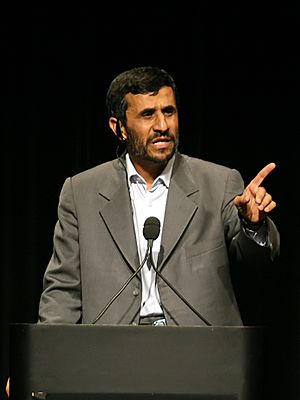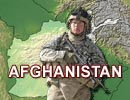 Image via WikipediaIran Nuclear Talks Collapse With No Progress - NYTimes.com
Image via WikipediaIran Nuclear Talks Collapse With No Progress - NYTimes.comIran Nuclear Talks Collapse With Lack of Progress
By STEVEN ERLANGER
Published: January 22, 2011
ISTANBUL — Two days of talks between Iran and six world powers ended in failure Saturday, with Iran refusing to engage here on any concrete proposals to build confidence that its nuclear program is only for peaceful purposes and with no date set for another meeting.
Related
Times Topic: Iran's Nuclear Program
Western officials expressed disappointment, but not surprise. And they reiterated that their proposals, including a deal under which Iran would ship out enriched uranium in return for nuclear fuel, were still in effect should Iran choose to open talks without preconditions.
The head of the delegation of the six, Catherine Ashton, the European Union foreign policy chief, said: "Our proposals remain on the table. Our door remains open. Our telephone lines remain open."
But with no new talks scheduled, the Obama adminstration will now face new pressures to ramp up another round of sanctions against Iran.
The opening day of the talks, on Friday, was acrimonious, with a late-night plenary session becoming tense and irritable before an agreement to meet again on Saturday, senior Western diplomats said.
Iran refused to discuss specifics and continues to assert that it is in full compliance with nuclear agency inspectors, while insisting on its right to enrich uranium no matter what the United Nations Security Council demands.
“The Iranians still will not admit that they have a problem with the world,” one diplomat said late Friday night. “Every idea we put forward they find a reason not to take it up.” He said that the talks came very close to ending Friday night, but the parties agreed in the end to continue them on Saturday morning.
The six powers — the United States and the other four members of the United Nations Security Council, plus Germany — had asked for the extra session in order to shape a framework for further talks and confidence-building measures, the diplomats said. They emphasized that the six would not agree to any preconditions.
After a two-hour opening plenary session on Friday morning largely given over to summarizing known positions, the talks broke at about noon for Friday prayers and lunch, and did not resume again until 4 p.m. Then, a bilateral meeting between the Iranian chief negotiator, Saeed Jalili, and the representative of the world powers, Catherine Ashton, the European Union foreign policy chief, convened for 90 minutes.
But Western diplomats expressed disappointment with the results of the meeting. They said that Ms. Ashton laid out an agreed position on how to move forward, with a revised fuel swap deal for Iran’s already enriched uranium and a series of bilateral meetings, including one with the United States. But Mr. Jalili said that first there must be recognition of Iran’s right to enrich uranium and a lifting of “measures” — understood as sanctions — that would “would jeopardize Iran’s rights and obligations” under the Nuclear Non-Proliferation Treaty.
The diplomats said that Iran’s right to enrich uranium for peaceful purposes was a given, and that the sanctions had been imposed by the United Nations Security Council after Iran failed to deal honestly and completely with the International Atomic Energy Agency . They said they wanted to move into detailed discussions with Iran of a modified fuel swap deal, first laid out in October 2009, designed to remove enough enriched uranium to prevent Iran from building a bomb in return for fuel rods for a small Tehran reactor making medical isotopes.
. They said they wanted to move into detailed discussions with Iran of a modified fuel swap deal, first laid out in October 2009, designed to remove enough enriched uranium to prevent Iran from building a bomb in return for fuel rods for a small Tehran reactor making medical isotopes.
 . They said they wanted to move into detailed discussions with Iran of a modified fuel swap deal, first laid out in October 2009, designed to remove enough enriched uranium to prevent Iran from building a bomb in return for fuel rods for a small Tehran reactor making medical isotopes.
. They said they wanted to move into detailed discussions with Iran of a modified fuel swap deal, first laid out in October 2009, designed to remove enough enriched uranium to prevent Iran from building a bomb in return for fuel rods for a small Tehran reactor making medical isotopes.The point of this Istanbul meeting has been “to find out if Iran is serious” about negotiating, a senior Western diplomat said. There is still no clear answer to that question, but American and French officials in particular have said in the last few days that “talking cannot be an endless process,” even as they have expressed relief that Iran is having difficulties with its centrifuges and the estimated time for it to be nuclear-bomb capable has been extended.
While Mr. Jalili has had other bilateral meetings with the Russians and the Turks, who are supposed to be simply hosting the talks, he has not yet taken up an open invitation for a separate meeting with the United States delegation and its leader, William J. Burns, the under secretary of state for political affairs. The last formal bilateral meeting between the two was in October 2009.
In the bilateral with Mr. Jalili, Ms. Ashton “put forward where we would like to go in the process in a positive fashion,” a Western diplomat said. “We want to push it forward on the basis of no preconditions.” But so far, he said, there has been no discussion of the details of any modified fuel swap or any agreement on a framework for further negotiations. He called the results of the meeting “inconclusive.”
The goal of the six is to get Iran to suspend enrichment entirely, at least for the period of serious negotiations; all these talks are trying to do is to create enough mutual trust to shape a process, including confidence-building measures like the fuel swap, to enable more serious talks to take place on an agreed agenda. The six are also offering a set of economic and technical aid programs if Iran agrees to stop enrichment.
Iran insists its nuclear program is only for civilian energy; most of the rest of the world believes that the program is military.
Tehran is under four sets of Security Council sanctions for refusing to cease enrichment and other activities that could be used to make nuclear weapons, and has regularly kept its enrichment activities secret from the International Atomic Energy Agency, which says it still has serious questions Iran will not answer.
But Iran came to the table warning that it would never stop enrichment. “Resolutions, sanctions, threats, computer virus nor even a military attack will stop uranium enrichment in Iran,” Ali Asghar Soltanieh, Iran’s ambassador to the nuclear agency, told Iranian state television.
Iran has regularly wanted to discuss a larger agenda at these talks, including global nuclear disarmament, Israel, and the American military presence in Iraq and Afghanistan.
The talks in Istanbul are scheduled to continue on Saturday. They are the second round of talks between Iran and the six after negotiations resumed last month in Geneva, breaking a 14-month hiatus.







No comments:
Post a Comment